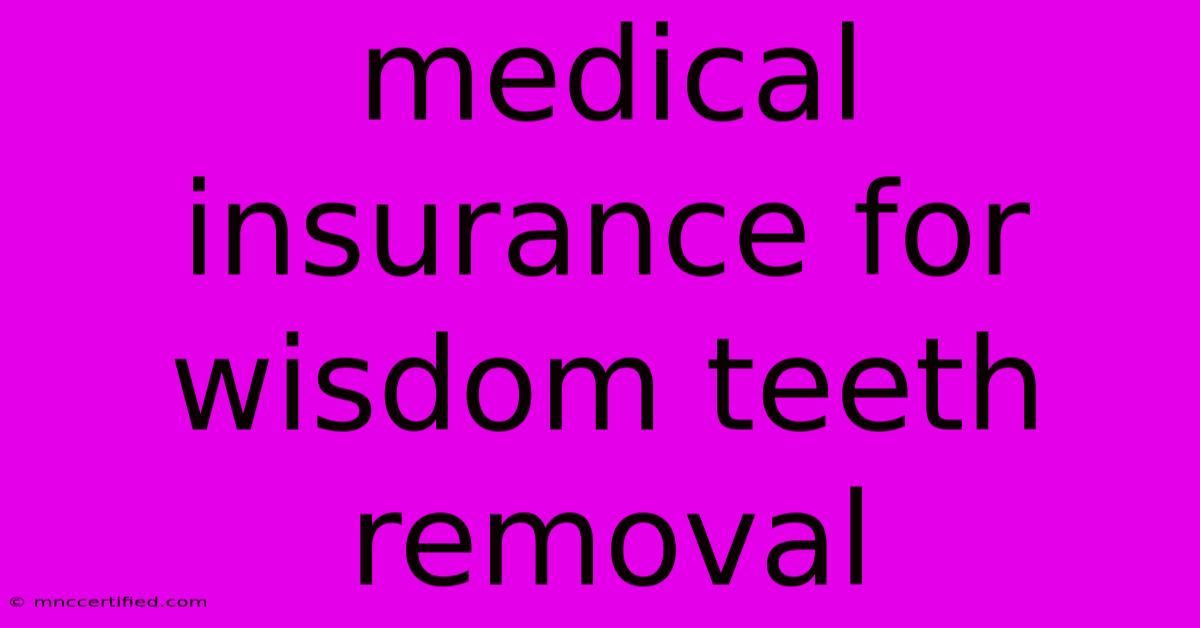Medical Insurance For Wisdom Teeth Removal

Table of Contents
Navigating the Costs: Medical Insurance and Wisdom Teeth Removal
Wisdom teeth, those pesky molars that erupt in your late teens or early twenties, often cause more trouble than they're worth. If you're facing the prospect of wisdom teeth removal, one of the first questions that comes to mind is: how much will it cost, and will my insurance cover it?
This article will guide you through the complexities of medical insurance and wisdom teeth removal, offering insights into what you can expect and how to prepare for this common dental procedure.
Understanding Your Dental Insurance Coverage
The first step is to review your dental insurance plan thoroughly. The extent of your coverage for wisdom teeth removal can vary drastically depending on your provider and policy.
Here are some key factors to consider:
- Plan type: Different plans offer varying levels of coverage, from basic plans with limited benefits to more comprehensive plans covering a wider range of procedures.
- Coverage for wisdom teeth: Some plans specifically exclude coverage for wisdom teeth removal, while others may only cover it under certain circumstances, such as when the teeth are impacted or causing pain.
- Benefit maximums: Be aware of any annual or lifetime benefit maximums for dental procedures, as this can impact the overall cost of your treatment.
- Co-pays and coinsurance: Understand the co-pays and coinsurance percentages associated with wisdom teeth removal, as these will contribute to the final cost.
- Pre-authorization requirements: Many insurance plans require pre-authorization for certain procedures, including wisdom teeth removal. Contact your insurance provider in advance to determine if pre-authorization is necessary and how to obtain it.
Common Scenarios and Coverage Expectations
Scenario 1: No Dental Insurance
If you lack dental insurance, wisdom teeth removal can be significantly costly. The total cost can range from a few hundred to several thousand dollars, depending on the complexity of the procedure, the number of teeth being removed, and the location of the dental practice.
Scenario 2: Basic Dental Insurance
Basic dental insurance plans often cover a limited amount for preventative care and basic treatments. While they may offer some coverage for wisdom teeth removal, the coverage may be minimal, requiring you to shoulder a substantial portion of the cost.
Scenario 3: Comprehensive Dental Insurance
Comprehensive dental insurance plans typically offer more generous coverage for wisdom teeth removal. However, the coverage may still be subject to certain limitations, such as pre-authorization requirements, co-pays, and coinsurance.
Scenario 4: Medical Insurance Coverage
In some cases, medical insurance may cover wisdom teeth removal if the procedure is deemed medically necessary due to complications like infection or impacted teeth causing significant pain or discomfort.
Tips for Minimizing Costs
Regardless of your insurance coverage, there are strategies to minimize the overall cost of wisdom teeth removal:
- Shop around: Compare prices from different dentists and clinics to find the best rates.
- Explore financing options: Consider dental financing plans or medical credit cards that can help you pay for the procedure over time.
- Ask about payment plans: Many dental offices offer payment plans to make the costs more manageable.
- Discuss your options with your dentist: They can provide personalized advice based on your specific needs and insurance coverage.
Remember: It's crucial to prioritize your oral health. Don't delay necessary procedures due to financial concerns. Talk to your dentist and insurance provider to develop a plan that fits your budget and ensures you receive the treatment you need.
By understanding your insurance coverage and exploring your options, you can navigate the cost of wisdom teeth removal with confidence.

Thank you for visiting our website wich cover about Medical Insurance For Wisdom Teeth Removal. We hope the information provided has been useful to you. Feel free to contact us if you have any questions or need further assistance. See you next time and dont miss to bookmark.
Featured Posts
-
Gary Barlows Son Height Comparison To Take That
Nov 07, 2024
-
Trumps Views On Project 2025 A Closer Look
Nov 07, 2024
-
Leavitt Recreation And Hospitality Insurance
Nov 07, 2024
-
Trumps Win Stops Walzs Third Minnesotan Vp Run
Nov 07, 2024
-
Trump Win Polymarket Whale Profits 20 Million
Nov 07, 2024